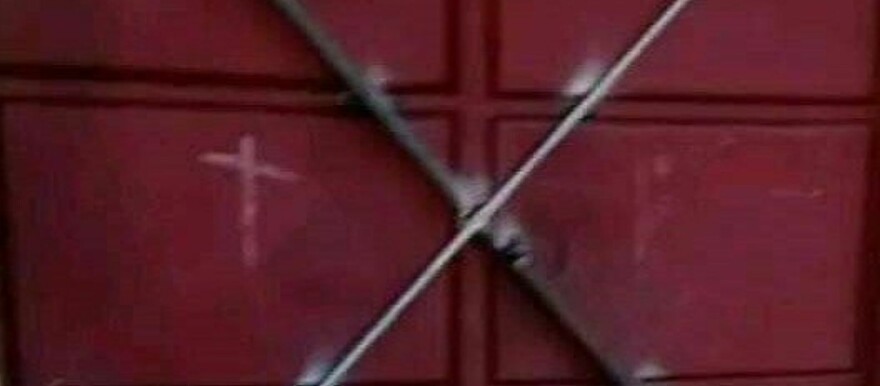Members of Saint Peter’s Langbaar B church in Bor, Jonglei State, are facing prolonged disruption in their worship activities due to the ongoing conflict within the Episcopal Church of South Sudan (ECSS).
The church, with a congregation of approximately 1,500 people, has been closed since August 6, 2023. The shutdown was initiated by local chiefs and youth after a violent clash between supporters of Archbishop Justin Badi Arama, the Primate of ECSS, and Bishop Reuben Akurdit Ngong. Bishop Ngong was defrocked by Archbishop Badi in 2020 over canonical disobedience.
Armed youth from Makuac Payam of Bor County stormed the church compound, welding shut the doors and windows, forcing the faithful to seek alternative places for worship, either in other churches or at home.
Expressing their discontent in interview with Radio Tamazuj Monday, the faithful argue that the church’s closure infringes upon their constitutional right to freedom of worship and poses a challenge to their faith.
“We are facing significant hardship due to the absence of a place for prayer. Our fundamental right to worship God has been denied, compelling some members to attend services at nearby churches such as Pentecostal, Seventh-day Adventist, and others. This issue has adversely affected the faith of some of our congregation members,” expressed David Chol Ajhok, a member of St. Peter Langbaar B parish.
Chol conveyed disappointment and frustration regarding the prolonged leadership dispute within the ECSS.
“While we await a resolution, it’s crucial to note that the church is a sanctuary of peace. Despite our capability to forcibly reopen our church, we prioritize peace. Our sole desire is to worship God in our church,” Chol added.
David Jok Majak, the evangelist at St. Peter Langbaar B parish, highlighted that the closure of the church has not only impacted the spiritual life of the members but also disrupted their social and economic activities.
“In the past, we had numerous programs within the church, including women’s groups, youth groups, choir, Sunday school, and more. We used to contribute funds for church development and support those in need within our community. However, all these activities have come to a halt,” stated Jok.
Michael Bathou, the Spokesperson of Makuac Diocese under Ruben Akurdit, expressed the opinion that the church should remain closed. He emphasized a desire for peace and avoidance of conflict, stating, “We don’t want any fighting or chaos. If the church has been closed and there is harmony, then we don’t want that church to be opened again because when it is open, that is when the fight starts. As the church, we don’t want to figh anymore.”
Numerous attempts to reach Manyang Gabriel, the spokesperson for Archbishop Justin Badi, for comments were unsuccessful.
Jonglei State Information Minister, Elizabeth Nyadak, stated that members of Langbaar B church are free to reopen but emphasized the government’s stance against violence or insecurity.
Nyadak said, “The government of Jonglei state has no problem with reopening the church. If the church leaders come together and agree, let them go ahead. But the only thing that we will not tolerate is going back to conflict.”
The ECSS conflict has garnered attention from civil society groups and human rights activists, who advocate for dialogue and reconciliation among church leaders and members. Bol Deng Bol, Chairperson of Intrepid South Sudan, a local NGO, emphasized that the ECSS conflict poses a threat to social cohesion, particularly in Jonglei State, where the church has a large following.
He urged both the government and the church to respect the constitutional right of freedom of worship and religion, emphasizing the need for a peaceful and amicable resolution to the dispute.
“The Transitional Constitution, specifically under the Bill of Rights, upholds freedom of worship and religion. The government and religious organizations bear the responsibility of ensuring this freedom is protected and not violated. The ongoing internal conflict within the ECSS has unmistakably breached this constitutional provision, exacerbated by the government’s inaction, leading to communal and tribal tensions,” stated Bol.
The conflict within the ECSS has caused division among its faithful and clergy in Bor and Juba, prompting government intervention to mediate between the two factions.
However, Archbishop Justin Badi, in a statement last year, accused the government of meddling in church affairs and failing to safeguard the church, clergy, and followers from harassment and intimidation by Bishop Reuben Akurdit’s supporters.
Badi demanded the government promptly reopen Langbaar B church and permit the ECSS to operate freely in Bor town. Established in 1899 by British missionaries, the ECSS is one of South Sudan’s largest and oldest churches, boasting millions of members nationwide.




